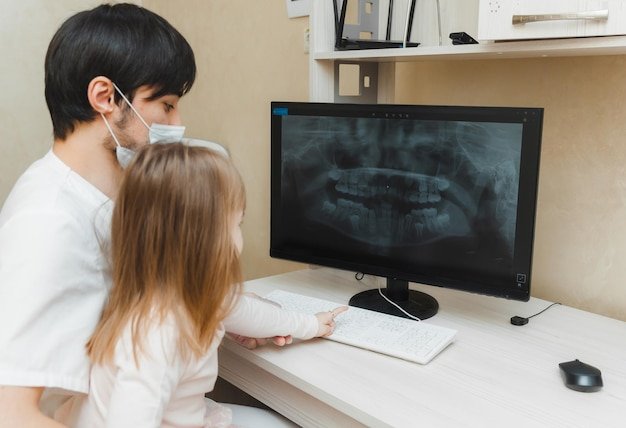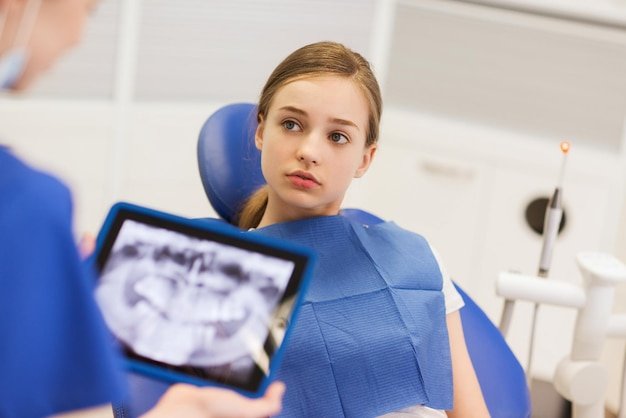Pediatric dental x-rays are specialized imaging techniques that provide dentists with a detailed view of your child’s teeth and jaw. This advanced technology allows for the diagnosis of various dental issues that might not be visible during a standard oral examination. X-rays can reveal hidden cavities, assess the health of developing teeth, and monitor the progress of oral health treatments, thereby playing a critical role in preventive dental care.
Types of Pediatric Dental X-Rays
There are several types of dental x-rays that might be used depending on your child’s specific needs:
- Bitewing X-Rays: These x-rays are crucial for detecting decay between teeth and monitoring changes in bone density caused by gum disease. They provide a comprehensive view of the upper and lower back teeth in a single image, making them an essential tool for routine check-ups.
- Periapical X-Rays: Focused on capturing one or two teeth from root to crown, these x-rays are indispensable for identifying issues below the gum line or within the tooth root. They are particularly useful in diagnosing infections or abscesses that could lead to more serious dental problems if left untreated.
- Panoramic X-Rays: Offering a broad view of the entire mouth, including all teeth in both the upper and lower jaws, panoramic x-rays are often used to plan orthodontic treatments. They can also help detect issues such as impacted teeth or jaw disorders that require attention.
- Occlusal X-Rays: These x-rays provide a detailed view of the roof or floor of the mouth, enabling the detection of extra teeth, unerupted teeth, jaw fractures, cleft palates, cysts, abscesses, or growths. They are particularly beneficial for evaluating the overall health and structure of your child’s oral cavity.
According to the American Dental Association, dental x-rays are safe when used properly and are essential for detecting hidden issues.
How Are Dental X-Rays Taken?
The process of taking dental x-rays is quick and straightforward, designed to ensure minimal discomfort for your child. During the procedure, your child will be asked to remain still while a small piece of plastic is placed inside their mouth to hold the x-ray film. The x-ray machine is then positioned next to their head, and the images are captured in a matter of seconds. Modern dental offices often utilize digital x-rays, which not only emit lower levels of radiation but also provide immediate image results, allowing for quicker diagnosis and treatment planning.
Are Dental X-Rays Safe for Kids?
A primary concern for many parents is the safety of dental x-rays, particularly regarding radiation exposure. Fortunately, pediatric dental x-rays are considered safe for children, thanks to advancements in technology and strict safety protocols. Dentists use the lowest possible radiation dose needed to capture clear images, and protective measures such as lead aprons and thyroid collars are employed to further minimize exposure, ensuring your child’s safety during the procedure.

Understanding Radiation Levels
To put things into perspective, the amount of radiation exposure from a dental x-ray is extremely low. In fact, a typical dental x-ray exposes your child to less radiation than they naturally receive from the environment in a single day. Advances in technology, especially digital x-rays, have significantly reduced the amount of radiation used in dental imaging, making it a safe and effective diagnostic tool.
Safety Precautions
Dentists follow strict guidelines to ensure x-ray safety for children. These precautions include:
- Thorough Assessment: X-rays are only taken when necessary, based on a careful evaluation of your child’s oral health needs. This ensures that your child is not exposed to unnecessary radiation.
- Protective Gear: Lead aprons and thyroid collars are used to shield your child’s body from radiation, providing an extra layer of protection during the x-ray procedure.
- Trained Professionals: Only trained and certified dental professionals perform x-ray procedures, ensuring that all safety protocols are followed and that your child receives the highest standard of care.
When Do Kids Need Dental X-Rays?
Pediatric dentists recommend x-rays based on your child’s individual needs. Several factors influence the timing and frequency of x-rays, including age, oral health history, and risk factors for dental problems. Understanding when and why your child might need x-rays can help you make informed decisions about their dental care.
Initial X-Ray Assessment
Most children will have their first dental x-rays taken around age 6, when permanent teeth start to come in. This initial assessment is crucial for identifying any potential issues with tooth development and alignment early on, allowing for timely interventions that can prevent more serious problems in the future.
Frequency of X-Rays
After the initial x-rays, the frequency of subsequent x-rays will depend on your child’s oral health. Children with a higher risk of cavities or other dental problems may require more frequent x-rays, while those with a lower risk may need them less often. Your dentist will work with you to determine the most appropriate x-ray schedule for your child, ensuring that their dental health is monitored effectively.
Importance of Pediatric Dental X-Rays
Pediatric dental x-rays play a crucial role in maintaining your child’s oral health. They help in:

- Early Detection of Cavities: X-rays can reveal cavities that are not visible during a regular dental exam, allowing for early intervention and treatment, which can prevent more extensive dental procedures later on.
- Monitoring Growth and Development: X-rays help track the development of the jaw and teeth, which is vital for planning orthodontic treatment if needed. This monitoring can guide decisions about braces or other orthodontic interventions.
- Identifying Hidden Issues: X-rays can detect problems such as impacted teeth, abscesses, cysts, and other abnormalities that might not be apparent otherwise. Early detection of these issues can lead to more effective treatment and better outcomes for your child’s oral health.
To learn more about the benefits of specialized care for children, visit our pediatric dentistry services page.
Questions to Ask Your Dentist
As a parent, it’s important to be informed and involved in your child’s dental care. Here are some questions you might consider asking your dentist about pediatric dental x-rays:
- Why are x-rays necessary for my child? Understanding the specific reasons for x-rays can help you feel more confident about the procedure.
- What type of x-ray will be taken, and what will it show? Knowing what to expect can help prepare your child and alleviate any anxiety they might have.
- How often will my child need x-rays? Discussing the frequency of x-rays can help you plan for future dental visits and ensure that your child’s oral health is monitored appropriately.
- Are there alternatives to x-rays that provide the same information? Exploring all diagnostic options can help you make informed decisions about your child’s dental care.
- How do you ensure my child’s safety during the x-ray process? Understanding the safety measures in place can provide peace of mind and reinforce your trust in the dental practice.
Conclusion
Understanding pediatric dental x-rays is an important part of ensuring your child’s oral health. While it’s natural to have concerns about radiation exposure, rest assured that dental professionals use the latest technology and safety measures to protect your child. By staying informed and asking the right questions, you can ensure that your child receives the best possible dental care.
Pediatric dental x-rays are a valuable tool in maintaining your child’s oral health, helping to detect potential issues early and support their development. Always feel free to discuss any concerns you may have with your child’s dentist—they are there to help guide you and ensure your child’s healthy smile. By working together with your dental care team, you can contribute to your child’s lifelong dental health and well-being.
